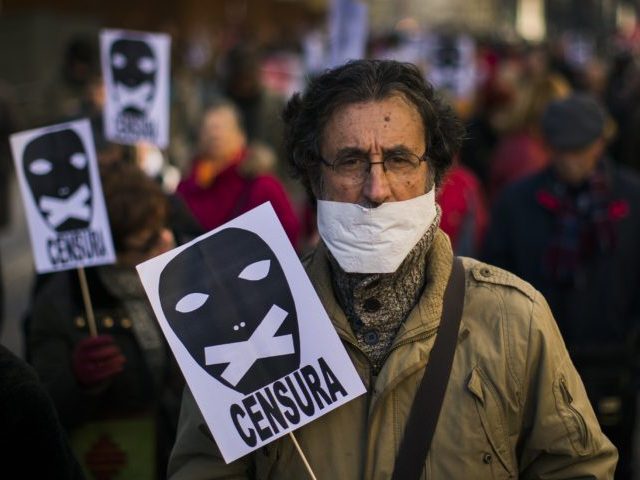In a recent op-ed, Bloomberg predicted that 2018 will be the year of heavily censored social media.
In a recently published op-ed titled, “Welcome to 2018, the Year of Censored Social Media,” Leonid Bershidsky explores the growing issue of censorship across social media platforms, an issue that Breitbart Tech has focused on for some time. Bershidsky discussed the recent announcement by the German government that they plan to enforce online hate speech laws introduced in 2017 across all social media platforms, a move that could cost the companies running those platforms millions in fines if they don’t immediately remove offending content from their platforms within 24 hours. As a result, social media companies have become particularly hasty to remove any content that may fall under the term of “hate speech.”
Bershidsky notes that on January 1st, 2018, Beatrix von Storch, a right-wing legislator for German political party AfD, was removed from Twitter for questioning a tweet sent in Arabic by a German police Twitter account. “What the hell is going on in this country?” she tweeted in response. “Do you mean to soften up the barbaric, Muslim, group-raping male hordes in this way?” Von Storch was banned from Twitter for this tweet. AfD co-leader Alice Weidel came to von Storch’s defense in a tweet saying, “Censorship! Our authorities surrender to imported, marauding, grabbing, fighting, knife-sticking migrant mobs. Beatrix von Storch correctly criticizes German police for tweeting in Arabic — and is closed down.” Von Storch has since had her account reinstated.
AfD is just one group likely to fall victim to Germany’s strict hate speech laws and as a result are likely to fight future account suspensions or tweet deletions in court according to Bershidsky. Von Storch is already testing ways to get around Twitter’s censorship rules, tweeting in a sarcastic manner, “There are no barbarians among the group-raping male hordes. Especially not when they’re Muslims. I find it fantastic that they feel good here and have fun. So?” Thus far, Twitter has not removed the tweet, so it seems that sarcasm may be a line of defense for Germans on Twitter.
Top-selling German newspaper Bild has decried the new social media censorship calling the new law a “sin” against freedom of opinion which is guaranteed in the German constitution. “Please spare us the thought police!” reads a headline in the paper, Bild Editor-in-Chief Julian Reichelt commented on the German law saying “The law against online hate speech failed on its very first day. It should be abolished immediately,” Reichelt wrote, stating that the social media censorship law was turning AfD politicians into “opinion martyrs.”
Bershidsky states that social media censorship is not limited to just Germany. In December 2017, Facebook banned the warlord leader of the Chechen Republic, Ramzan Kadyrov, from both Facebook and Instagram. Facebook’s argument for doing so was that Kadyrov had been added to the U.S. government’s sanction list,but many other sanctioned individuals retain their accounts across Facebook’s platforms. The removal of Kadyrov from these platforms also made it much harder for journalists covering Chechnya to gain vital information on the warlord.
Read the full piece in Bloomberg View here.
Lucas Nolan is a reporter for Breitbart News covering issues of free speech and online censorship. Follow him on Twitter @LucasNolan_ or email him at lnolan@breitbart.com

COMMENTS
Please let us know if you're having issues with commenting.